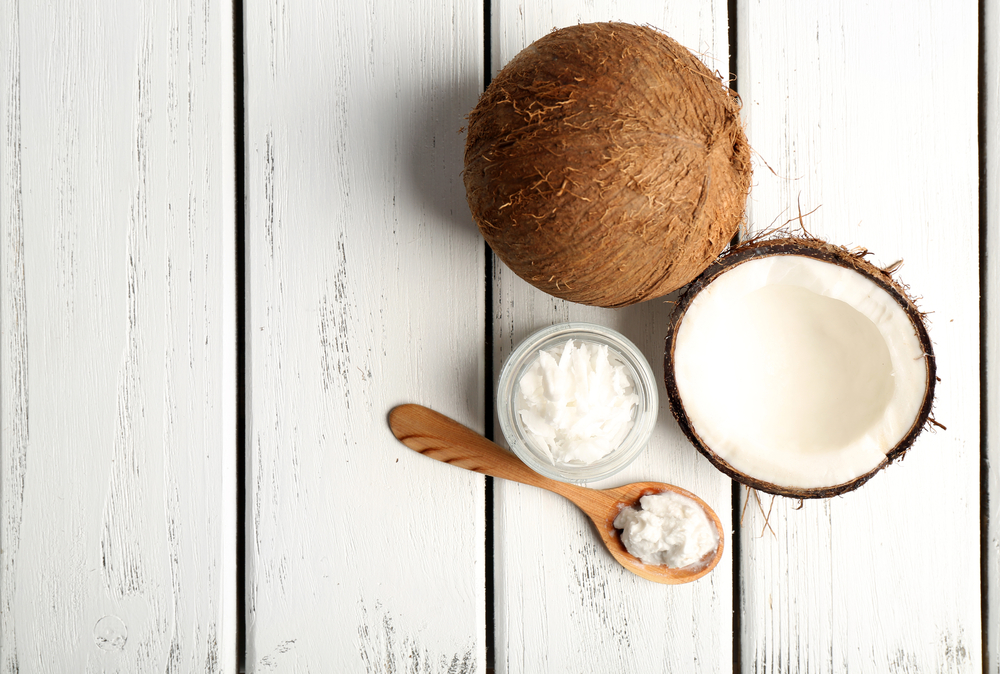
There's been a lot of hype surrounding coconut oil in recent years with many labelling it as a 'superfood' due to its many health benefits and applications. Coconut oil is extracted from the dried flesh of the coconut. While coconut oil and coconut milk are made up of mostly saturated fat, about half of the saturated is actually a beneficial type of fat known as medium-chain triglycerides (MCT). The MCTs in coconut oil are made up of lauric, caprylic and capric fatty acids. In the body, lauric acid converts to monolaurin, a compound know to boost and support the immune system. In addition to benefitting the immune system, lauric acid also aids in the increase of the 'good' cholesterol know as HDL and while it also increases LDL cholesterol, the number of the small LDL particles (the ones associated with cardiovascular risk), are lower. In the body MCT oils get easily absorbed direclty from the gut to the liver and are used up for energy. This makes coconut oil a great fuel source for the body and may enhance sport performance and brain function. This is in contrast to other oils such as corn, soy, sunflower and canola which, are transported from the gut into the lymphatic system thus allowing them to be taken up by fat cells. On the topic of body fat, some studies suggest tha coconut oil may help reduce body fat and abdominal obesity. This may be due to the effect of MCT on the body's metabolism and fat-burning capacity. In addition consuming coconut oil, as with any fat, increases satiety (the feeling of feeling full) leading to a decrease in total calorie intake per day.
Other benefits of coconut oil include its antifungal, antibacterial and antiviral effects. It can be applied topically to dry skin and hair and used in the Ayurvedic practice of 'oil pulling' (meaning you swish it around in your mouth for 15-20 minutes), to prevent gum disease and cavities.
As with any food, be it 'superfood' or otherwise. moderation is the key; enjoy your coconut oil/coconut milk but don't go crazy!
Tips for using coconut oil:
Look for coconut oil that is vigin, organic, cold-pressed, unrefined and never deodorised or bleached.
Use it in curry dishes and stir-frys, add it to smoothies or soups, or stir it into hot beverages.
One of my favourtie ways to enjoy coconut oil is by consuming it as coconut milk in chia seed pudding. For a tasty breakfast choice, snack or dessert, give the recipe below a try:
Chia Seed Pudding
In addition to the benefits of coconut milk, this recipe contains chia seeds which, are packed with nutrients such as calcium, vitamin C, iron, potassium, soluble and insoluble fibre, and omega 3 fats and almond milk- a great source of both calcium and magnesium.
Ingredients
1/2 cup almond milk (see my note at end) 1/2 cup coconut milk (preferably organic) 3 tablespoons of Chia seeds
1 teaspoon of vanilla bean paste
dash of maple syrup (optional)
Method
Mix all ingredients in a glass bowl. Seal with a lid and let it set overnight in the fridge.
You can eat it plain or add seasonal fruit such as mango or berries, nuts and shredded coconut, or add some raw cacao powder for a chocolaty treat. For some anti-inflammatory punch, add turmeric powder or paste, and cinnamon.
Serves 2-3.
Almond milk can be easily made at home by adding one tablespoon of almond butter to one cup of filtered water. Mix in blender and it's done! If you choose to use store-bought almond milk choose unsweetened versions with no added vegetable oils or other additives.
References
Assunçao, M.L., Ferreira, H.S., dos Santos, A.F., Cabral Jr, C.R. and Florêncio, T.M., 2009. Effects of dietary coconut oil on the biochemical and anthropometric profiles of women presenting abdominal obesity. Lipids,44(7), pp.593-601.
Hyman, M 2016, Eat Fat Get Thin, Hodder & Stoughton, UK.
Nevin, K.G. and Rajamohan, T., 2004. Beneficial effects of virgin coconut oil on lipid parameters and in vitro LDL oxidation. Clinical biochemistry, 37(9), pp.830-835.
Ogbolu, D.O., Oni, A.A., Daini, O.A. and Oloko, A.P., 2007. In vitro antimicrobial properties of coconut oil on Candida species in Ibadan, Nigeria.Journal of medicinal food, 10(2), pp.384-387.
Verallo-Rowell, V.M., Dillague, K.M. and Syah-Tjundawan, B.S., 2008. Novel antibacterial and emollient effects of coconut and virgin olive oils in adult atopic dermatitis. Dermatitis, 19(6), pp.308-315.
St-Onge, M.P., Bourque, C., Jones, P.J.H., Ross, R. and Parsons, W.E., 2003. Medium-versus long-chain triglycerides for 27 days increases fat oxidation and energy expenditure without resulting in changes in body composition in overweight women. International journal of obesity, 27(1), pp.95-102.